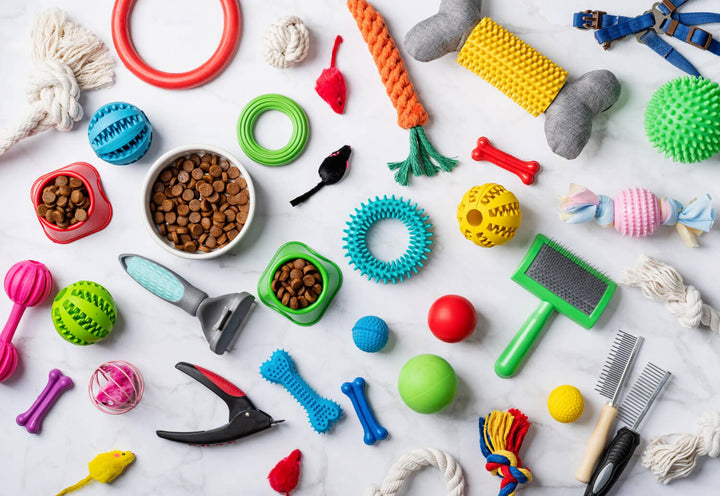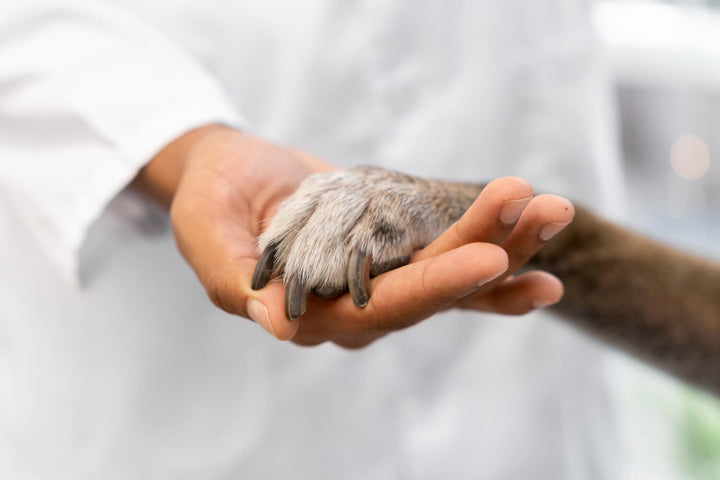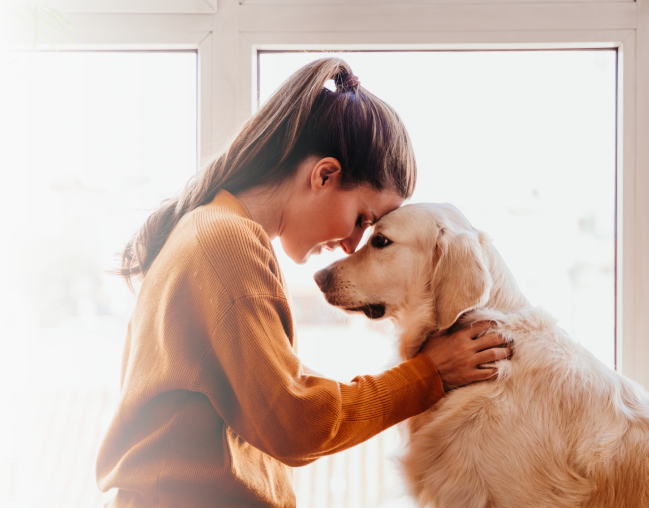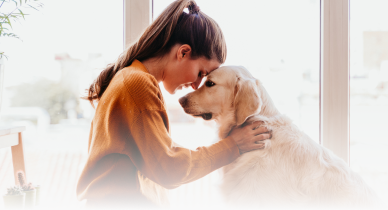Elegance and intelligence intertwine in the captivating Poodle, a breed that has graced the world with its undeniable charm and versatility. From the regal Standard Poodle to the miniature and toy variations, these dogs possess an innate allure that has captured the hearts of dog enthusiasts worldwide. With their distinctive curly coats and an air of sophistication, Poodles are not only a delight to the eye but also a true testament to the bond between canine and human.
Did You Know these Facts about the Poodle?
-
Poodles are renowned for their exceptional intelligence and trainability, making them adept in various roles, including circus performers, service dogs, and even water retrievers.
-
The unique Poodle coat serves a practical purpose beyond aesthetics – it acts as a natural insulator, helping them stay warm in cold water during their retrieving tasks.
-
Poodles come in an array of colors, from classic black and white to striking apricot and silver. Their coat texture, coupled with their color diversity, lends them an aura of individuality and charm.
-
Despite their sometimes sophisticated appearance, Poodles are incredibly playful and energetic companions, always ready for a spirited game of fetch or a romp in the park.
-
Poodles hold the title of the second-most intelligent dog breed, right behind the Border Collie, showcasing their sharp minds and adaptability.
In terms of formally registered dog breeds, the Poodle stands as a timeless favorite, ranking at the #5 AKC's list of Most Popular Dog Breeds of 2022. Its allure and versatility have propelled it to consistently rank among the top breeds, cherished for its intelligence, elegance, and unwavering companionship. Poodles have carved a special place in the hearts of dog lovers, solidifying their position as one of the most sought-after breeds in the world.

Traits of the Poodle Breed
Overall Personality. Poodles are the embodiment of sophistication and companionship. Their intelligent and alert nature makes them quick learners, thriving on mental stimulation and challenges. They exhibit a sense of elegance and grace that is unmistakable, while their friendly demeanor and loyalty endear them to families and individuals alike.
Family Life. Poodles are remarkably adaptable, seamlessly fitting into various lifestyles and households. Their affectionate disposition makes them wonderful family pets, forming strong bonds with children and adults alike. Whether it's a game of fetch or a cozy evening cuddle, Poodles are always ready to be a loving and cherished member of the family.
Physical Appearance. Poodles boast a distinctive appearance marked by their curly, hypoallergenic coat that comes in an array of captivating colors. From the stately Standard Poodle to the portable Toy Poodle, their sizes may vary, but their elegance remains constant. Poodles carry an air of regal charm, accentuated by their beautifully coifed fur and captivating presence.
Sociability. Social butterflies by nature, Poodles thrive in the company of both two-legged and four-legged companions. Their playful energy and friendly demeanor make them a hit at dog parks and social gatherings, forging connections that bring joy to everyone they encounter.
Average Sizes & Life Expectancy
- Height: 10 to 15 inches tall (25.4 to 38 cm)
- Weight: 4 to 70 pounds (2 to 31 kg), depending on their category Standard, Miniature or Toy
- Life Expectancy: Around 12 to 15 years
Detailed Description of the Poodle Breed
The Poodle, a breed of exceptional charm and distinction, has long been celebrated for its intelligence, versatility, and unmistakable elegance. With a history dating back centuries, this remarkable breed has graced the world's stages, homes, and hearts, leaving an indelible mark on the tapestry of canine companionship. From its captivating appearance to its unwavering loyalty, the Poodle stands as a true testament to the deep and enduring bond between humans and their four-legged companions.
Physical Appearance. One cannot help but be entranced by the Poodle's unique and stylish appearance. Its most distinguishing feature is its dense, curly coat, which can be seen in various colors such as black, white, apricot, silver, and more. This iconic coat isn't just for show; it serves a practical purpose too, acting as a natural insulator that helps the Poodle stay warm even in cold water. Poodles come in three distinct sizes: the stately Standard, the charming Miniature, and the endearing Toy. Regardless of size, Poodles carry themselves with an air of regal grace, their well-proportioned bodies and refined features captivating the eye.
Traits and Characteristics. At the heart of the Poodle's allure lies its remarkable intelligence and trainability. Renowned for their cognitive prowess, Poodles excel in a wide range of activities and roles. From circus performers to service dogs and from water retrievers to loyal companions, they have proven time and again that they are up for any challenge. This breed's playful spirit is balanced by an innate elegance, making them a captivating blend of sophistication and fun. Their expressive eyes seem to convey an understanding that goes beyond words, forging a deep and lasting connection with their human counterparts.
Temperament and Personality. The Poodle's temperament is a blend of friendliness, intelligence, and loyalty. They are quick to form strong bonds with their families, often displaying an almost uncanny ability to sense their humans' emotions. Gentle and affectionate, Poodles are known to get along well with children and other pets, making them wonderful additions to multi-pet households. Their playful nature ensures that there's never a dull moment when a Poodle is around, as they're always ready for a game of fetch, a brisk walk, or a leisurely cuddle session.
Adaptability. One of the Poodle's most remarkable qualities is its adaptability. Regardless of living situation or lifestyle, Poodles have an uncanny ability to seamlessly integrate themselves into various homes and environments. Whether you're a city dweller in a cozy apartment or a suburban family with a spacious yard, a Poodle can adapt and thrive. Their hypoallergenic coat is a boon for those with allergies, and their eagerness to please makes them suitable for both first-time dog owners and experienced enthusiasts.
Care Guidelines. Maintaining the Poodle's distinctive appearance requires regular grooming to keep their luxurious coat in top condition. Professional grooming visits are often recommended, but regular brushing at home is essential to prevent matting.
Their high intelligence demands mental stimulation, so engaging them in interactive play, puzzle toys, and training sessions is essential for their well-being. Regular exercise is a must to keep their minds and bodies in top shape, ensuring a content and happy Poodle.
Training Strategies. Training a Poodle is can be great fun thanks to their sharp minds and eagerness to learn. Positive reinforcement methods work wonders with this breed, as they thrive on praise, treats, and playtime. Their intelligence often means they can pick up commands quickly, making them suitable candidates for various dog sports and activities. Socialization from an early age is crucial, as it helps them become well-adjusted and confident dogs in various social settings.
Notable in History and Pop Culture. The Poodle's influence stretches beyond the realm of companionship, as they have made their mark in history and popular culture. In the 18th century, Poodles were employed as water retrievers for hunters and were also embraced by the French aristocracy as fashionable companions. Their versatility was showcased during World War II, where they served as loyal and skilled messenger dogs. Additionally, Poodles have made appearances in various films and TV shows, often portrayed as clever and charming characters that capture the audience's hearts.
In short, the Poodle is a breed that encapsulates elegance, intelligence, and boundless affection. Their unique coat, playful spirit, and unwavering loyalty make them a treasured addition to families and homes around the world. With a rich history, versatile abilities, and an endearing presence in popular culture, the Poodle stands as a testament to the enduring and timeless bond between humans and their furry companions.
What to expect when living with the Poodle Breed
Owning a Poodle is akin to inviting elegance, intelligence, and unwavering companionship into your life. Their personality is a harmonious blend of playfulness and sophistication, making them a delightful addition to any household. Poodles thrive in environments where they receive ample mental and physical stimulation. Their high intelligence demands regular mental challenges, so interactive play, puzzle toys, and training sessions are a must to keep their minds engaged and content.
Personality. These dogs are social butterflies and enjoy the company of both humans and other pets. Their friendly and affectionate nature makes them ideal family companions, forming strong bonds with children and adults alike. Poodles are known to be excellent watchdogs, alerting their families to any unusual activity with their distinctive barks. When it comes to training, Poodles are quick learners and thrive on positive reinforcement methods. Their eagerness to please makes them highly trainable, excelling in various dog sports and activities.
Ideal Environment. Poodles are highly adaptable and can flourish in various living situations. They're just as at home in an apartment as they are in a spacious house with a yard, as long as their exercise and mental stimulation needs are met.
Maintenance Level. Their hypoallergenic coat is a boon for allergy sufferers, but it does require regular grooming to prevent matting and maintain its luxurious appearance. Many Poodle owners opt for professional grooming to ensure their coat stays in top condition, but routine brushing and occasional baths at home are essential.
Overall Health Expectations and Best Health Tests for the Poodle Breed
Health Considerations. Poodles are generally robust and healthy dogs, but like all breeds, they are prone to certain health conditions. One of the most notable concerns for Poodles is hip dysplasia, a genetic condition that affects the hip joint's development and can lead to pain and mobility issues. Regular hip evaluations by a veterinarian are recommended, especially for breeding dogs.
Another health consideration is Progressive Retinal Atrophy (PRA), an inherited eye disorder that can lead to vision loss over time. Regular eye examinations and genetic testing can help identify carriers and reduce the risk of passing on this condition to future generations.
Poodles are also prone to bloat, a serious condition that can occur when a dog's stomach fills with gas and twists on itself. This requires immediate veterinary attention. To reduce the risk of bloat, it's recommended to feed Poodles smaller, more frequent meals and avoid vigorous exercise immediately after meals.
Recommended Health Tests. Health tests such as hip evaluations, eye exams, and genetic tests for PRA can provide your Poodle with the best possible quality of life for years to come.
Best Nutrition, Diet & Supplements for the Poodle Breed
Nutrition and Diet. Providing the right nutrition is crucial to ensuring the health and vitality of your Poodle. A well-balanced diet tailored to their size, age, and activity level will support their overall well-being and contribute to a long and happy life. Poodles benefit from high-quality, commercial dog food that is specifically formulated to meet their nutritional requirements. Look for brands that list real meat, poultry, or fish as the primary ingredient, as these sources provide essential protein for muscle development and overall health. Opt for recipes that include whole grains, vegetables, and fruits to provide a range of nutrients.
Protein is essential for a Poodle's growth, maintenance, and overall health. It supports their lean muscle mass and keeps their coat and skin in optimal condition. Ensure that the protein source is of high quality and easily digestible. Carbohydrates provide energy for your Poodle's daily activities. Opt for complex carbohydrates like whole grains (brown rice, quinoa) and vegetables, which release energy slowly and help keep your dog satisfied.
Hydration is Key. Ensure your Poodle always has access to fresh, clean water. Proper hydration is vital for digestion, temperature regulation, and overall vitality.
Supplements. Given the breed's susceptibility to hip dysplasia, glucosamine and chondroitin supplements can support joint health and mobility. Omega-3 supplements, often sourced from fish oil, can help maintain a healthy coat and skin, reduce inflammation, and support cognitive function. Probiotic supplements can promote a healthy digestive system and support gut health, which in turn can strengthen the immune system.
Foods to Avoid. Certain foods can be harmful or toxic to Poodles. Avoid feeding them chocolate, grapes, raisins, onions, garlic, and foods high in salt and fat. These substances can lead to serious health issues.
Remember that each Poodle is unique, and their dietary needs can vary. Regular visits to the veterinarian, along with careful observation of your dog's health and behavior, will help you make informed decisions about their nutrition and supplementation. By providing your Poodle with a nourishing and well-rounded diet, you're laying the foundation for a vibrant and healthy life.
Grooming Requirements for the Poodle Breed
Grooming a Poodle is an art form that celebrates their iconic appearance and ensures their well-being. Their luxurious, hypoallergenic coat demands regular maintenance to keep it healthy and free from matting. Depending on the Poodle's size and coat type, grooming needs may vary, but consistent care is key to preserving their elegant look.
Coat Maintenance and Shedding. Poodles are renowned for their low-shedding, hypoallergenic coat. This makes them a great choice for allergy sufferers. Their dense, curly coat traps hair, which means that instead of shedding, loose hairs get caught in the coat, reducing the amount of hair that ends up around the house.
Paw Care and Hygiene. Poodle paw care is essential, especially if your dog spends time on different surfaces. Regularly check their paw pads for any cuts, debris, or foreign objects. Trimming the hair around the paws can prevent matting and discomfort.
Ears and Eye Care. Poodles' ears are prone to trapping moisture, which can lead to infections. Regularly clean their ears and check for signs of redness or odor. Poodles' eyes should also be examined to ensure they are clear and free from discharge.
Grooming Frequency. Grooming requirements vary based on the Poodle's size and coat style. Regular brushing is essential to prevent matting and tangling, which can be uncomfortable for the dog. For Standard and Miniature Poodles, brushing two to three times a week is generally sufficient. Toy Poodles may need more frequent brushing due to their smaller size and denser coat.
Many Poodle owners opt for professional grooming every 4 to 6 weeks. Professional groomers are skilled in creating traditional Poodle cuts such as the "Lamb Clip" or the elaborate "Continental Clip." These cuts not only showcase the Poodle's unique appearance but also help keep their coat manageable and comfortable.
Exercise Required for the Poodle Breed
Poodles are energetic and playful companions that thrive on physical activity and mental stimulation. The amount and type of exercise they need will depend on their size, age, and individual preferences.
oodles, regardless of size, require regular exercise to maintain a healthy weight and overall well-being. Daily walks, interactive play sessions, and games of fetch are excellent ways to meet their exercise needs.
Poodles are highly intelligent dogs that benefit from mental challenges. Engage them in activities that stimulate their minds, such as puzzle toys, obedience training, and interactive games. Mental exercise is as important as physical activity for their overall happiness.
While all Poodles need exercise, the intensity and duration may vary. Standard Poodles, being larger, require more vigorous exercise to keep them physically and mentally satisfied. Miniature and Toy Poodles may have slightly lower exercise requirements, but mental stimulation remains essential for all sizes. Aim for at least 30 to 60 minutes of physical activity daily, supplemented by mental exercises. Breaking exercise into multiple sessions throughout the day can help prevent boredom and ensure a content dog.
Poodles are versatile and can excel in various activities, including agility, obedience, and even water sports. Their strong swimming abilities make them naturals in the water, so a fun swim can be an excellent exercise option. As Poodles age, their exercise needs may change. Puppies and younger Poodles will have higher energy levels, while older Poodles may require gentler exercise routines. Always tailor their exercise regimen to their age, health, and individual preferences.
Training Tips for the Poodle Breed
Training a Poodle is a rewarding experience, thanks to their intelligence, willingness to learn, and strong desire to please. Effective training enhances the bond between you and your Poodle while ensuring their well-being and good behavior. Here are some valuable training tips for success:
Do…
-
Poodles respond exceptionally well to positive reinforcement techniques. Use treats, praise, and playtime as rewards for desired behaviors.
-
Establish consistent rules and commands. Use the same cues and rewards every time to avoid confusion.
-
Introduce your Poodle to various people, places, and situations from a young age. Proper socialization helps prevent shyness or fearfulness.
-
Engage their intellect with puzzle toys, obedience training, and interactive games. Mental exercise is crucial for their well-being.
-
Keep training sessions short, fun, and engaging. Poodles enjoy a challenge, so mix up the activities to maintain their interest.
Don't…
-
Use harsh methods or punishment-based training. Poodles thrive on positive interactions and may become fearful or anxious with harsh treatment.
-
Skip foundational skills such as sit, stay, come. Good leash manners are essential. Neglecting them can lead to behavioral issues and difficulties in communication.
- Confuse your Poodle with inconsistency. If you allow them on the couch one day and scold them for it another day, they may not understand the expectations.
The Poodle Breed is Suitable For
Poodles are versatile companions that can thrive in various homes, making them a popular choice for families, singles, and seniors alike.
They make great sports buddies for active individuals who enjoy outdoor activities, jogging, hiking, or participating in canine sports.
They are are excellent family dogs. They are gentle with children and can form strong bonds. Supervise interactions, especially with younger kids, to ensure a harmonious relationship.
Poodles can adapt to different living spaces. While they appreciate a yard for play, they can also be content in apartment living if provided with regular exercise and mental stimulation.
Poodles usually get along well with other pets, including other dogs and cats. Proper introductions and early socialization are key to successful cohabitation.
The Poodle Breed is Not Suitable For
Poodles may not be the best fit for homes that lack time for exercise and mental engagement. They thrive on companionship and can become anxious or bored in environments with little interaction. Poodles may not be suitable for:
Poodles are social dogs that thrive on human interaction. Leaving them alone for long periods can lead to separation anxiety and destructive behavior.
These dogs require regular grooming to maintain their coat's health and appearance. Neglecting grooming can result in matting and discomfort.
Famous Poodle Owners
-
Winston Churchill - The iconic British Prime Minister was an avid Poodle lover. His Poodles, Rufus I and II, were known for their loyalty and presence during critical moments of history.
-
Elvis Presley - The King of Rock 'n' Roll had a deep affection for Poodles. His Poodle, Champagne, was a beloved companion who accompanied him on tours and travels.
- Barbra Streisand - The multi-talented entertainer is known for her fondness for Poodles. She famously cloned her Poodle, Samantha, and has been an advocate for animal welfare.
Accomplishments of the Poodle Breed
The Poodle breed has left an indelible mark on history, art, and pop culture. Known for their intelligence and versatility, Poodles have achieved remarkable accomplishments:
Poodles have shone in various roles, from circus performers to water retrievers. Their agility and trainability have made them champions in dog sports such as obedience and agility. They have appeared in movies including "The Royal Tenenbaums," showcasing their distinctive appearance and charming personalities.
Poodles make invaluable service dogs, assisting individuals with disabilities, and offering emotional support to those in need. They have long been associated with elegance and refinement, and are popular contestants at dog shows and competitions.
In conclusion, whether as beloved family members or accomplished performers, Poodles continue to enchant and captivate hearts around the world.

The History of the Poodle Breed
The history of the Poodle is a captivating tale that spans centuries and continents, tracing its origins from functional beginnings to its present status as an iconic and beloved companion breed. With its distinctive appearance and versatile nature, the Poodle has evolved from a working dog to become a cherished household companion, leaving an indelible mark on the world of canine companionship.
Creation and Purpose. The Poodle's roots can be traced back to Germany, where it was initially bred as a water retriever. The breed's name is derived from the German word "Pudel," which means "to splash in water." Poodles were expert water dogs, prized for their exceptional swimming abilities and keen retrieving skills. Their dense, curly coat provided insulation, enabling them to perform water-related tasks even in cold conditions.
The breed's unique coat was not just a matter of aesthetics but served a practical purpose. It protected Poodles from the elements and provided buoyancy in water, making them indispensable for waterfowl hunting. Their intelligence and versatility further contributed to their role as working dogs, gaining favor with hunters across Europe.
Early Roles and Evolution. As the Poodle's utility diminished in the hunting realm, it found a new calling as a fashionable companion among European nobility. France, in particular, embraced the Poodle's elegance and charm, giving rise to its association with French culture. The elaborate grooming and distinctive haircuts that we associate with Poodles today have their origins in this era, when the breed underwent a transformation from utilitarian water dog to aristocratic lapdog.
The Poodle comes in three distinct sizes – Standard, Miniature, and Toy – each with its unique attributes. The Standard Poodle, with its larger size and impressive presence, continued to be favored by hunters and performers. The Miniature and Toy Poodles found their place as companions to the upper echelons of society, adored for their compact size and charming personalities.
Over time, Poodles have showcased their versatility in various roles asevidenced by their popularity across different domains, from entertainment to assistance.They excelled in circuses, performing tricks that highlighted their intelligence and agility. They serve as therapy and service dogs, aiding individuals with disabilities.
Changes and Modern Impact. In contemporary society, the Poodle continues to enchant and captivate as a beloved companion. Its hypoallergenic coat has made it a favorite among allergy sufferers, and its intelligent and trainable nature makes it a sought-after breed for dog sports and activities. The Poodle's adaptability allows it to thrive in a range of environments, from bustling city apartments to sprawling suburban estates.
As the Poodle's role has shifted from utilitarian to elegant to versatile companion, its core attributes of intelligence, loyalty, and charm have remained steadfast. Through the ages, the Poodle has evolved from a skilled water retriever to a cherished member of countless families, leaving an indelible legacy of elegance, utility, and enduring companionship.
The Poodle Breed Standard
The Poodle is classified as a member of the Non-Sporting Group by the American Kennel Club (AKC). This group comprises diverse breeds that don't fit neatly into other categories. The Poodle's intelligence, versatility, and elegance make it a standout representative of this group.
According to the American Kennel Club's Breed Standard, the ideal Poodle is a picture of grace, intelligence, and elegance. The breed standard describes Poodles of all sizes as well-proportioned, well-muscled dogs with distinctive grooming and stylish appearance. Their movement is characterized by a springy gait and an air of dignity. Specific coat colors, grooming guidelines, and other details are meticulously laid out to serve as a reference for judges in dog shows. This standard is established by the Poodle Club of America and is officially recognized by the AKC.
The Poodle Club of America (PCA) is the foremost national breed club dedicated to the preservation, promotion, and well-being of Poodles. For comprehensive information about the breed, you can visit their official website: Poodle Club of America
General Appearance
The Poodle, a breed known for its intelligence, agility, and distinctive appearance, embodies a harmonious combination of grace and utility. From its regal head to its lively gait, the Poodle's general appearance is a testament to its unique blend of form and function.
Head. The head of a Poodle is characterized by its refined elegance and intelligent expression. It is well-proportioned to the body, with a slightly arched skull that adds to its dignified appearance. The forehead is well-defined, and the stop is moderate, creating a smooth transition from the head to the muzzle.
Muzzle and Nose. The muzzle of a Poodle is straight and long, creating a balanced profile. The nose is typically black or a shade that complements the coat color. The nostrils are well-developed and open, allowing for efficient airflow. This muzzle design contributes to the Poodle's distinctive profile and regal bearing.
Teeth. Poodles possess a strong and well-aligned set of teeth that meet in a scissor bite. The teeth are white, even, and neatly arranged, reflecting the breed's attention to detail and overall refinement.
Neck. The neck of a Poodle is arched and strong, seamlessly connecting the head to the body. It is set high and carried proudly, enhancing the breed's overall posture and elegant presence.
Body. The body of a Poodle is squarely built and well-muscled, conveying a sense of athleticism and agility. The chest is deep and moderately wide, providing ample room for lung capacity. The back is strong and level, flowing into a well-developed loin that enhances the breed's balanced silhouette.
Tail. The tail of a Poodle is set high and carried with a confident carriage. It is customarily docked in countries where it is allowed, though docking is becoming less common. The tail, when present, is straight, held aloft, and contributes to the breed's overall poise and elegance.
Coat. The coat of a Poodle is iconic and distinctive, known for its dense, curly texture that forms tight cords. The coat offers a unique blend of style and function, providing protection from the elements and showcasing the breed's elegant lines. Poodles are often groomed in various cuts, such as the Continental Clip or English Saddle, which further accentuate their regal appearance.
Size. Poodles come in three distinct sizes: Standard, Miniature, and Toy. The Standard Poodle is the largest, standing over 15 inches at the shoulder. The Miniature Poodle stands between 10 to 15 inches, and the Toy Poodle stands under 10 inches. Despite the size variation, all Poodles share the same distinct features that define the breed.
Gait. The gait of a Poodle is characterized by its smooth, springy, and effortless movement. The breed's agility and grace are evident in its stride, which reflects its heritage as a water retriever. The Poodle's gait is balanced, coordinated, and exudes a sense of purpose and confidence.
In summary, the Poodle's general appearance is a masterpiece of refined elegance and versatility. From its meticulously sculpted head to its distinctive coat and graceful gait, the Poodle embodies a harmonious blend of beauty, intelligence, and athleticism, making it a timeless and cherished breed that captivates the hearts of dog enthusiasts worldwide.
Reputable Breeders
It's essential to acquire a dog from responsible and ethical breeders who prioritize the health and well-being of their puppies. Here are a few reputable Poodle breeders along with their URLs:
Top Shelters for Adoption
Adopting a dog can be a rewarding experience. Here are five shelters where you might find a Poodle in need of a loving home:
Top 5 Frequently Asked Questions & Answers about the Poodle Breed
Are Poodles hypoallergenic?
Yes, Poodles are considered hypoallergenic, as their low-shedding coat produces fewer allergens.
How much exercise do Poodles need?
Poodles are energetic and require regular exercise, including 30 -60 minutes of daily walks (depending on their size), and plenty of energetic games which provide physical and mental stimulation.
Do Poodles get along with children and other pets?
Yes, Poodles are generally friendly and can coexist well with children and other pets when properly socialized.
Are Poodles easy to train?
Yes, Poodles are highly intelligent and trainable. Positive reinforcement methods work well with them.
Are there any specific health concerns for Poodles?
Poodles are prone to certain conditions like hip dysplasia and Progressive Retinal Atrophy. Regular health check-ups are important.
A Final Tip for Bringing a Poodle into Your Life
Bringing a Poodle into your life means embracing a world of elegance, intelligence, and boundless companionship. These versatile dogs effortlessly transition from water retrievers to cherished family members. With their hypoallergenic coat, playful spirit, and unwavering loyalty, Poodles are ideal companions for various lifestyles. Whether you seek an active partner for outdoor adventures or a devoted friend for cozy evenings, the Poodle's adaptability and loving nature ensure that they'll steal your heart and become an enduring source of joy in your life.
Valuable Resources for Your Journey to Parenting a Poodle
At Felicitails you will find many wonderful services, supplies and guides for your life ahead with a loving pup at your side.

Hope You Enjoyed The Read!
Tag Cloud

A warm welcome from Lindsay & Huck (my English Pointer). Hope you enjoy the read and find just what you are looking for when it comes to living your best life with your loved pets.

-
Dog Breeds
(42)
-
Emotional Support Animals
(10)
-
Dog Grooming
(6)
-
Dog Health
(18)
-
Life with a Dog
(18)
-
Dog Nutrition
(11)
-
Service Animals
(11)
-
Dog Training
(5)






